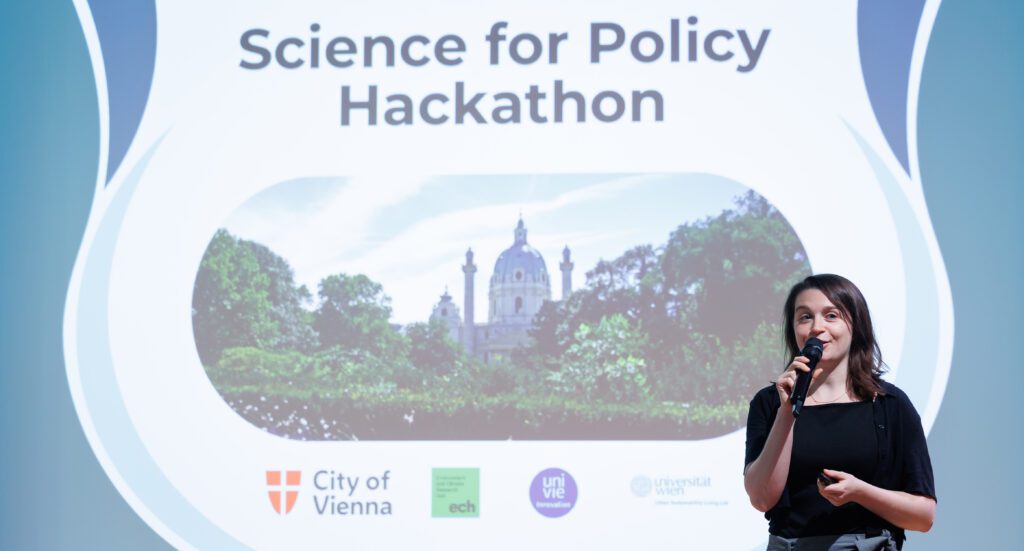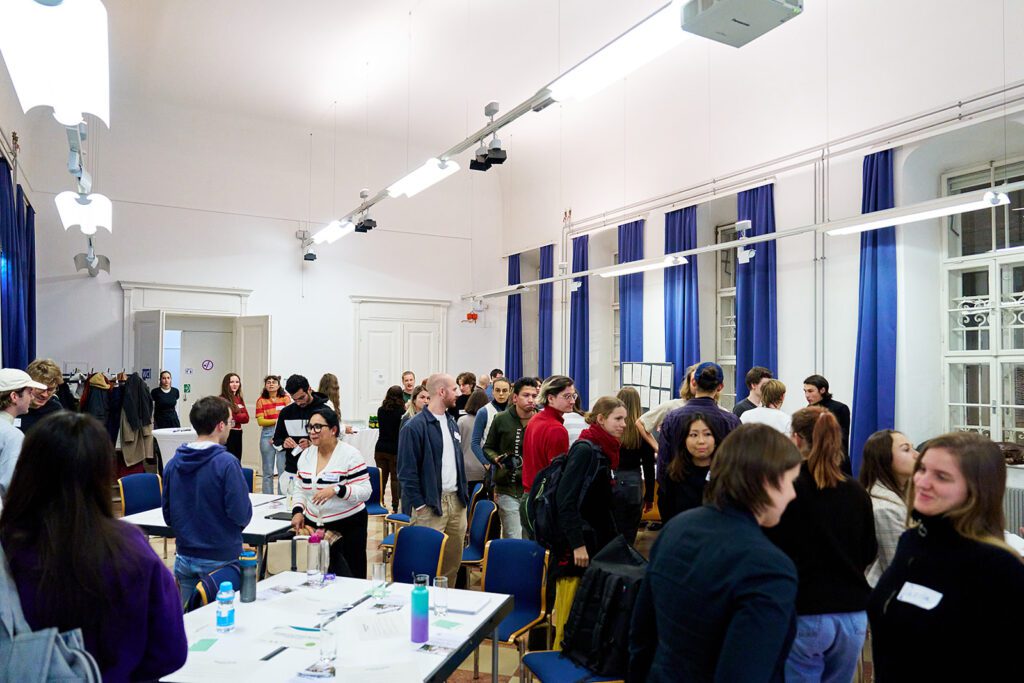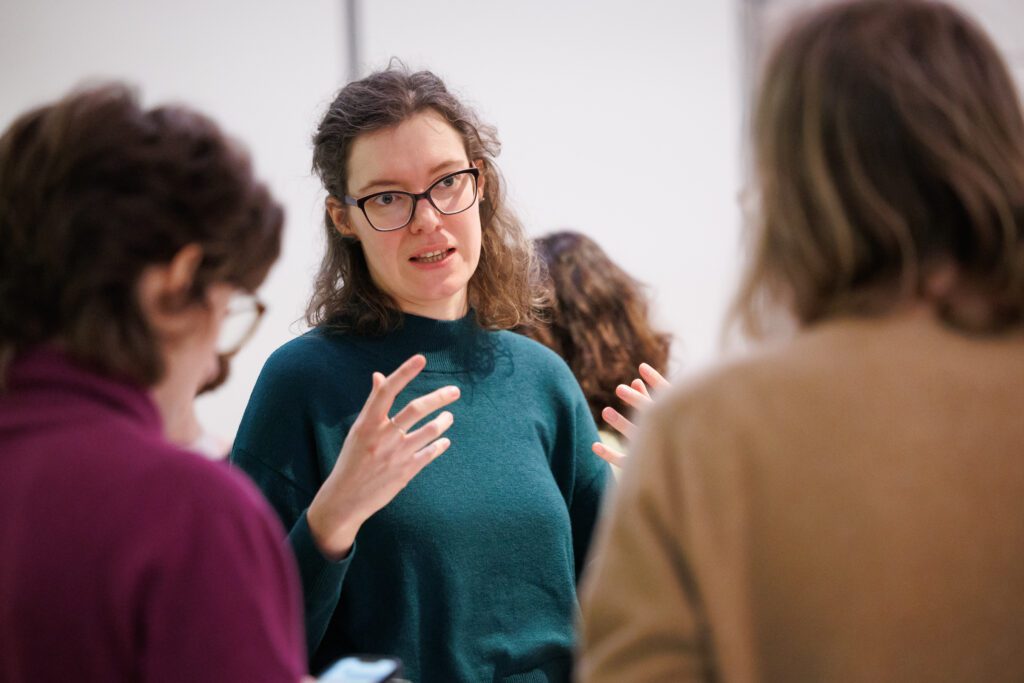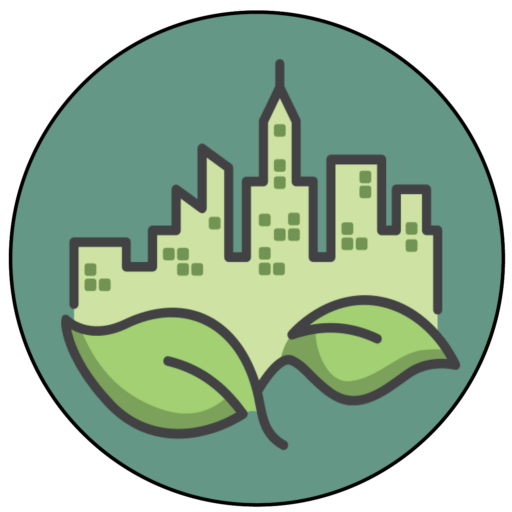Urban Research to Practice: Science for Policy Hackathon 2025/26
Das Urban Sustainability Living Lab (USLL) bietet in Zusammenarbeit mit dem UniVie Innovation Team und der Stadt Wien die Lehrveranstaltung Urban research to Praxis an. Diese beinhaltet Lehreinheiten, einen zweitägigen Hackathon sowie ein abschließendes Pitch-Event.
Ziel des Formats Urban Research to Practice ist es, Masterstudierende dabei zu unterstützen, inter- und transdisziplinäre Kompetenzen zu vertiefen und ihr Fachwissen in einem realen politischen Kontext der Stadt Wien anzuwenden. Die Teilnehmer*innen erhalten außerdem Einblicke in die Entwicklung wissenschaftsbasierter Politik im Allgemeinen, in relevante Strukturen und Prozesse der Stadt Wien im Besonderen sowie in berufliche Perspektiven im Bereich Science4Policy.
Städte wie Wien stehen vor zunehmend komplexen Herausforderungen, etwa der Anpassung an die wachsende Anzahl und Intensität von Hitzewellen, der Reduktion von CO₂-Emissionen im Verkehr und Wohnbau sowie dem Schutz und Ausbau der Biodiversität.
Transdisziplinäre Forschung und der Austausch mit unterschiedlichen städtischen Akteur*innen – wie Politik, Verwaltung, Fachexpert*innen und Bürger*innen – sind notwendig, um diese Herausforderungen gemeinsam zu verstehen und Lösungsansätze zu entwickeln. Wissenschaft spielt hierbei eine zentrale Rolle, indem sie evidenzbasierte Grundlagen liefert, mit deren Hilfe Entscheidungsträgerinnen gezielte Maßnahmen entwickeln und deren Wirkungen abschätzen können.
Die folgenden Herausforderungen werden von Gruppen von Teilnehmenden bearbeitet. Bitte beachten Sie, dass sich alle Herausforderungen ändern können und im Kurs näher erläutert werden.
Kühlungsinfrastrukturen für Klima- und Gesundheitsgerechtigkeit
Wie kann Wien sicherstellen, dass alle seine Bürger*innen während der zunehmend heißen Sommer kühl, sicher und gesund bleiben? Diese Herausforderung lädt Sie dazu ein, darüber nachzudenken, wie Kühlinfrastrukturen (wie öffentliche Kühlzonen oder Grünflächen) für verschiedene Nutzungsgruppen zugänglicher gemacht werden können, insbesondere für diejenigen, die besonders anfällig für Hitze sind. Sie werden untersuchen, welche Faktoren die Menschen mehr oder weniger anfällig für Hitze machen und welche Hindernisse für verschiedene Personengruppen beim Zugang zu und der Nutzung von Kühlinfrastrukturen bestehen. Schließlich werden Sie politische Empfehlungen entwerfen, die solche Infrastrukturen gerechter und inklusiver machen.
Multifunktionale öffentliche Räume
Was wäre, wenn Parkplätze zu Orten für Menschen werden würden, nicht für Autos? Bei dieser Herausforderung geht es darum, Wiens Straßen neu zu gestalten, indem Einwegparkplätze in multifunktionale öffentliche Bereiche umgewandelt werden, die Nachbarschaften zusammenbringen und aktive Mobilität fördern. Sie werden erfolgreiche Beispiele von aufgewerteten Parkplätzen studieren und Umsetzungshindernisse in Wien und anderen Städten identifizieren, bevor Sie mutige Maßnahmen vorschlagen, die multifunktionale, öffentliche Straßenlandschaften in der ganzen Stadt neu konzipieren und entwickeln.
Grünräume für Menschen & Natur
Wie kann Wien seine Grünflächen vernetzen, damit sowohl die Bewohner*innen als auch die Ökosysteme davon profitieren? Bei dieser Aufgabe sollen Sie sich mit Strategien für widerstandsfähige, vernetzte Grünflächen beschäftigen. Von biodiversitätsreichen Korridoren und den Hindernissen, die ihrer Entwicklung im Wege stehen, bis hin zu digitalen Überwachungsinstrumenten und gemeinsamer Verantwortung werden Sie erforschen, wie man die ökologische Gesundheit mit dem sozialen Wohlbefinden in Einklang bringen und Grünflächen gestalten kann, die Gemeinschaften stärken und die Umwelt regenerieren.
Empowering Climate Action
Wie kann kontinuierliches Lernen die Bürger*innen dazu inspirieren, sinnvolle Klimaschutzmaßnahmen zu ergreifen? Diese Herausforderung konzentriert sich auf die Frage, wie Klimabildung kontinuierlich, inklusiv und innovativ gestaltet werden kann, um Menschen aller Bevölkerungsgruppen zu erreichen. Sie werden erkunden, wie Nachbarschaften, Schulen, Online-Plattformen und Gemeinschaftsinitiativen gemeinsam Wissen schaffen und eine Kultur des kontinuierlichen Lernens in ganz Wien aufbauen können, die den Klimaschutz vorantreibt.
Das Programm besteht aus zwei Teilen: einer einsemestrigen Lehrveranstaltung (Oktober – Dezember) und einem zweitägigen Hackathon mit anschließendem Pitch (Jänner). Beim Hackathon arbeiten die Studierenden in interdisziplinären Teams an themenspezifischen Herausforderungen, die von der Stadt Wien vorgegeben werden. Diese sollen ganz oder teilweise mithilfe aktueller Forschungsergebnisse, bereitgestellter Informationen der Stadt, relevanter Strategien und Politiken auf lokaler, nationaler und internationaler Ebene sowie anhand von internationalen Best-Practice-Beispielen bearbeitet werden.
Zur Vorbereitung findet von Oktober bis Dezember eine wöchentliche Lehrveranstaltung des USLL statt, die Wissen und Kompetenzen zur Analyse urbaner Herausforderungen vermittelt. Die Studierenden werden in transdisziplinären Fähigkeiten geschult, bei der Kontaktaufnahme mit relevanten Abteilungen und Expert*innen der Stadt unterstützt und erhalten inhaltlichen Input zur evidenzbasierten Politikgestaltung.
Der Hackathon selbst dauert zwei Tage. In dieser Zeit werden Policy Briefs und zugehörige Pitches erarbeitet. Dabei erhalten die Studierenden Unterstützung durch eine Expertin für wissenschaftsbasierte Politikberatung sowie Fachleute der Stadt Wien.
Die entwickelten Strategiepapiere werden einer Jury vorgestellt. Die ausgewählten Gewinner*innen werden ihren Pitch im Rahmen der Ringvorlesung „Vom Wissen zum Handeln“, die von der Umwelt- und Klimazentrale der Universität Wien organisiert wird, vor einem großen Publikum präsentieren.
- Kick-off: 15. Oktober, 13:15 – 16:30 Uhr, Marietta-Blau-Saal, Hauptgebäude (Universitätsring 1, 1010)
- Vorlesungseinheiten: Mittwochs, 13:15 – 16:30 Uhr, vom 22. Oktober bis 10. Dezember, Hörsaal 21, Hauptgebäude (Universitätsring 1, 1010)
- Hackathon: 7-8 Januar, 9:00 – 17:00 Uhr, die HausWirtschaft (Bruno-Marek-Allee 5/1, 1020 Wien)
- Final Pitch: 15. Januar, 16:00 – 20:00 Uhr, die HausWirtschaft (Bruno-Marek-Allee 5/1, 1020 Wien)
- Winner’s Pitch: 21. Januar, 16:45 – 18:15 Uhr, Hörsaal 50, Hauptgebäude (Universitätsring 1, 1010); relevant für die Gewinnerteams
- Prof. Kerstin Krellenberg, Dr. Julia Wesely and James Vandenberg from the Urban Sustainability Living Lab lead the VU/course supported by Leonard Derle (tutor)
- Senior-Expert*innen der Stadt Wien liefern Hintergrundinformationen zu den Herausforderungen
- Senior Policy Expertin Lene Topp leitet den Hackathon und bringt Expertise zu Science for Policy-Prozessen ein
- Das Univie:Innovation Team unterstützt die Organisation des gesamten Formats und insbesondere des finalen Hackathons
Am 15. Oktober kamen mehr als 30 Studierende aus 11 Masterstudiengängen der Universität Wien mit dem Team von UniVie innovation, dem Urban Sustainability Living Lab und der Stadt Wien zusammen, um den diesjährigen Urban Research to Practice: Science for Policy Hackathon zu eröffnen.
Erfahren Sie mehr: Kick-off: Urban Research to Practice










